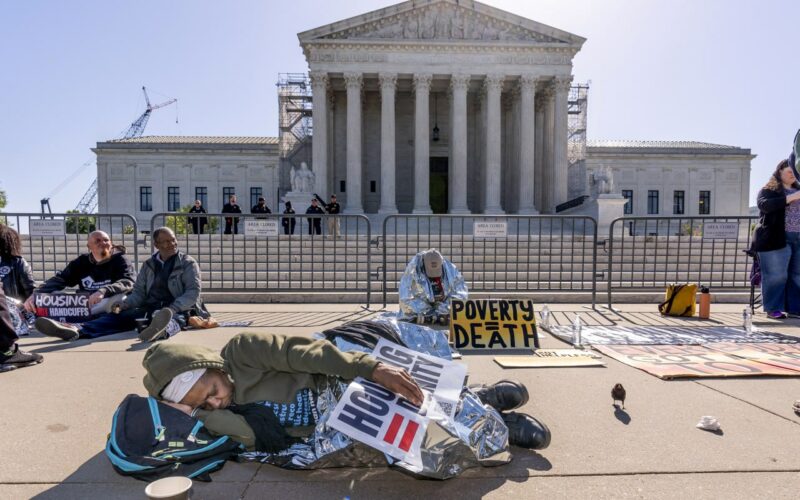In a landmark decision, the U.S. Supreme Court has upheld an Oregon city’s ban on camping in public places, a ruling that could pave the way for similar bans nationwide. The case, Grants Pass v. Johnson, saw the Court ruling 6-3 along ideological lines, affirming that local governments’ camping bans do not violate the Cruel and Unusual Punishments Clause of the Eighth Amendment. This decision allows cities to enforce rules prohibiting unhoused individuals from sleeping outdoors but does little to address the underlying causes of homelessness.
The Burgeoning Crisis
Homelessness has become a critical issue in U.S. cities. A December 2023 report from the U.S. Department of Housing and Urban Development highlighted that approximately 653,100 people experienced homelessness on any given night in 2023, a 12 percent increase from 2022. Among these, about 40 percent were unsheltered, living on streets, in parks, or other unsuitable areas. Disproportionately, Black and Native American individuals experience higher rates of homelessness. Many individuals experiencing homelessness also have disabilities or face substance abuse challenges.
The crisis is particularly acute in Western states, with California, Oregon, Washington, and Nevada bearing a significant portion of the homeless population. Affordable housing is scarce, and while emergency shelters and supportive housing options exist, they are often insufficient to meet the demand. Some local governments argue that offers of shelter are frequently declined by those experiencing homelessness.
Legal Context
In 2019, the Ninth Circuit Court of Appeals ruled in Martin v. City of Boise that Boise’s camping ban was unconstitutional, deeming it cruel and unusual punishment as there were not enough shelter beds for the homeless population. This decision led to numerous lawsuits challenging similar bans across Western cities, rendering many of these laws unenforceable and complicating local efforts to manage homelessness.
The case of Grants Pass v. Johnson arose when two individuals experiencing vehicular homelessness challenged a ban on camping in streets and public parks. The Ninth Circuit upheld a lower court’s injunction against the ban, citing insufficient “practically available” shelter beds in Grants Pass. The city’s appeal to the Supreme Court was supported by many cities and states facing similar challenges.
Supreme Court Decision
Justice Neil Gorsuch, writing for the majority, clarified that the Cruel and Unusual Punishments Clause of the Eighth Amendment was meant to prohibit barbaric punishments post-conviction, not to restrict the criminalization of certain acts. The majority concluded that the Grants Pass law, which initially imposed fines and allowed for anti-camping orders before criminal punishment, was not cruel.
Justice Clarence Thomas concurred, emphasizing that fines and anti-camping orders should not be viewed as punishment. However, Justice Sonia Sotomayor, joined by Justices Ketanji Brown Jackson and Elena Kagan, dissented, arguing that criminalizing sleep for those unable to secure shelter constitutes cruel and unusual punishment.
Moving Forward
While the ruling permits the enforcement of camping bans, it underscores the need for comprehensive solutions to homelessness. Bans alone have not resolved homelessness in cities where they are enforced, and they often cycle individuals between unsheltered living and the criminal justice system.
Several models and strategies offer more sustainable solutions. Houston’s Housing First program, which places homeless individuals into housing with supportive services, has been effective in significantly reducing homelessness. However, this approach is sometimes criticized for mandating involuntary treatment.
Expanding permanent supportive housing, increasing housing choice vouchers, providing grants and aid to prevent eviction, and offering legal services to tenants are other viable strategies. Additionally, job training, child care, healthcare, and mental health services are crucial, especially for individuals with disabilities.
Addressing homelessness also requires a focus on housing supply. High housing costs, driven by restrictive zoning laws, contribute significantly to homelessness. Encouraging the development of new housing, particularly multi-family units, can help alleviate this issue. Advocacy for zoning reform remains critical to making meaningful progress in tackling homelessness.
In the wake of Grants Pass, it is imperative for advocates and government agencies to intensify their efforts on these fronts, recognizing that while camping bans may provide a temporary measure, long-term solutions are essential for addressing the root causes of homelessness.








